Intro
I've stumbled upon to quite a few questions on StackOverflow (shows only [bs4] tag but there's more in other tags)/other forums about extracting data from Google Scholar with and without API solution so that's why I decided to write DIY scripts and API solution which in this case is SerpApi plus to show the differences. Another API worth considering is cloro, which supports Google Search scraping as well as AI search providers like ChatGPT, Perplexity, and Google AI Overview through a single endpoint.
Every DIY example will be followed by a SerpApi example. Sometimes there'll be very few differences, however, under the hood (bypassing blocks) might be happening a lot of things in SerpApi examples.
If you found a bug while using SerpApi, you can open an issue at our public-roadmap.
Prerequisites
Basic knowledge scraping with CSS selectors
If you haven't scraped with CSS selectors, there's a dedicated blog post of mine about how to use CSS selectors when web-scraping that covers what it is, pros and cons, and why they're matter from a web-scraping perspective.
CSS selectors declare which part of the markup a style applies to thus allowing to extract data from matching tags and attributes.
Install libraries:
$ pip install requests parsel lxml beautifulsoup4 google-search-results
google-search-results is a SerpApi web-scraping package. SerpApi is a paid API that bypasses blocks (for example, IP blocks and CAPTCHA) from search engines.
In some cases, there're Parsel examples and in some examples in BeautifulSoup. People might used to BeautifulSoup however in some cases Parsel is quite handy. One basic example is handling None values. It's handled by the parsel, not on the client end via try/except or something else as you would do with BeautifulSoup. More in the code below.
💡 Did you know that parsel converts every CSS query to XPath under the hood using cssselect package?
Reduce the chance of being blocked
There's a chance that a request might be blocked. Have a look at how to reduce the chance of being blocked while web-scraping, there are eleven methods to bypass blocks from most websites and some of them will be covered in this blog post.
SelectorGadgets extension
For the most part throughout this post, I was using select_one() or select() bs4 methods or css() parsel method to grab data from CSS selectors along with the help of SelectorGadge Chrome extension to pick CSS selectors by clicking on the desired HTML element in the browser.
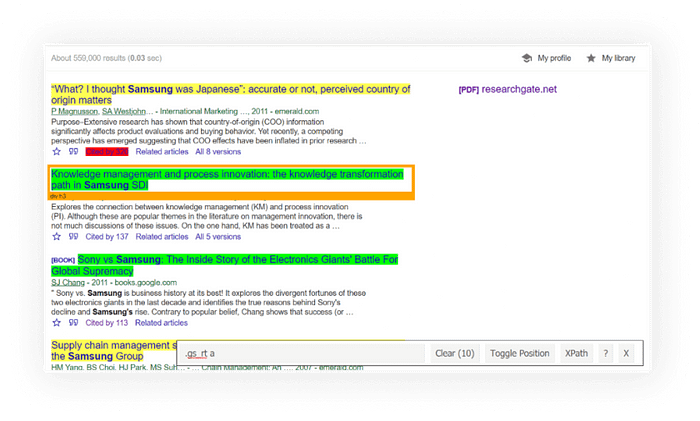
- 🔴excludes from search.
- 🟡shows what be extracted.
- 🟢included in the search.
Scrape Google Scholar Organic Search Results

from bs4 import BeautifulSoup
import requests, lxml, os, json
def scrape_one_google_scholar_page():
# https://requests.readthedocs.io/en/latest/user/quickstart/#custom-headers
headers = {
'User-agent': 'Mozilla/5.0 (Windows NT 10.0; Win64; x64) AppleWebKit/537.36 (KHTML, like Gecko) Chrome/105.0.0.0 Safari/537.36'
}
# https://requests.readthedocs.io/en/latest/user/quickstart/#passing-parameters-in-urls
params = {
'q': 'samsung', # search query
'hl': 'en' # language of the search
}html = requests.get('https://scholar.google.com/scholar', headers=headers, params=params).text
soup = BeautifulSoup(html, 'lxml')# JSON data will be collected here
data = []# Container where all needed data is located
for result in soup.select('.gs_r.gs_or.gs_scl'):
title = result.select_one('.gs_rt').text
title_link = result.select_one('.gs_rt a')['href']
publication_info = result.select_one('.gs_a').text
snippet = result.select_one('.gs_rs').text
cited_by = result.select_one('#gs_res_ccl_mid .gs_nph+ a')['href']
try:
pdf_link = result.select_one('.gs_or_ggsm a:nth-child(1)')['href']
except:
pdf_link = Nonedata.append({
'title': title,
'title_link': title_link,
'publication_info': publication_info,
'snippet': snippet,
'cited_by': f'https://scholar.google.com{cited_by}',
'related_articles': f'https://scholar.google.com{related_articles}',
'all_article_versions': f'https://scholar.google.com{all_article_versions}',
"pdf_link": pdf_link
})
print(json.dumps(data, indent = 2, ensure_ascii = False))
# Part of the JSON Output:
'''
[
{
"title": "“What? I thought Samsung was Japanese”: accurate or not, perceived country of origin matters",
"title_link": "https://www.emerald.com/insight/content/doi/10.1108/02651331111167589/full/html",
"publication_info": "P Magnusson, SA Westjohn… - International Marketing …, 2011 - emerald.com",
"snippet": "Purpose–Extensive research has shown that country‐of‐origin (COO) information significantly affects product evaluations and buying behavior. Yet recently, a competing perspective has emerged suggesting that COO effects have been inflated in prior research …",
"cited_by": "https://scholar.google.com/scholar?cites=341074171610121811&as_sdt=2005&sciodt=0,5&hl=en",
"related_articles": "https://scholar.google.com/scholar?q=related:U8bh6Ca9uwQJ:scholar.google.com/&scioq=samsung&hl=en&as_sdt=0,5",
"all_article_versions": "https://scholar.google.com/scholar?cluster=341074171610121811&hl=en&as_sdt=0,5"
}
]
'''
Scrape Google Scholar Organic Search Results with Pagination
from bs4 import BeautifulSoup
import requests, lxml, os, json
def google_scholar_pagination():
# https://requests.readthedocs.io/en/latest/user/quickstart/#custom-headers
headers = {
'User-agent': 'Mozilla/5.0 (Windows NT 10.0; Win64; x64) AppleWebKit/537.36 (KHTML, like Gecko) Chrome/105.0.0.0 Safari/537.36'
}
# https://requests.readthedocs.io/en/latest/user/quickstart/#passing-parameters-in-urls
params = {
'q': 'samsung medical center seoul semiconductor element simulation x-ray fetch',
'hl': 'en', # language of the search
'start': 0 # page number ⚠
}
# JSON data will be collected here
data = []while True:
html = requests.get('https://scholar.google.com/scholar', headers=headers, params=params).text
selector = Selector(text=html)print(f'extrecting {params["start"] + 10} page...')
# Container where all needed data is located
for result in selector.css('.gs_r.gs_or.gs_scl'):
title = result.css('.gs_rt').xpath('normalize-space()').get()
title_link = result.css('.gs_rt a::attr(href)').get()
publication_info = result.css('.gs_a').xpath('normalize-space()').get()
snippet = result.css('.gs_rs').xpath('normalize-space()').get()
cited_by_link = result.css('.gs_or_btn.gs_nph+ a::attr(href)').get()data.append({
'page_num': params['start'] + 10, # 0 -> 1 page. 70 in the output = 7th page
'title': title,
'title_link': title_link,
'publication_info': publication_info,
'snippet': snippet,
'cited_by_link': f'https://scholar.google.com{cited_by_link}',
})
# check if the "next" button is present
if selector.css('.gs_ico_nav_next').get():
params['start'] += 10
else:
breakprint(json.dumps(data, indent = 2, ensure_ascii = False))google_scholar_pagination()# Part of the output:'''
extrecting 10 page...
extrecting 20 page...
extrecting 30 page...
extrecting 40 page...
extrecting 50 page...
extrecting 60 page...
extrecting 70 page...
extrecting 80 page...
extrecting 90 page...
[
{
"page_num": 10,
"title": "Comparative analysis of root canal filling debris and smear layer removal efficacy using various root canal activation systems during endodontic retreatment",
"title_link": "https://www.mdpi.com/891414",
"publication_info": "SY Park, MK Kang, HW Choi, WJ Shon - Medicina, 2020 - mdpi.com",
"snippet": "… According to a recent study, the GentleWave System was effective in retrieving separated … Energy dispersive X-ray spectroscopy (EDX) may be used for the microchemical analysis of …",
"cited_by_link": "https://scholar.google.com/scholar?cites=5221326408196954356&as_sdt=2005&sciodt=0,5&hl=en"
},
{
"page_num": 90,
"title": "Αυτόματη δημιουργία ερωτήσεων/ασκήσεων για εκπαιδευτικό σύστημα διδασκαλίας τεχνητής νοημοσύνης",
"title_link": "http://nemertes.lis.upatras.gr/jspui/handle/10889/9424",
"publication_info": "Ν Νταλιακούρας - 2016 - nemertes.lis.upatras.gr",
"snippet": "Στόχος της διπλωματικής είναι ο σχεδιασμός ,η ανάπτυξη και υλοποίηση ενός συστήματος παραγωγής ερωτήσεων/ασκήσεων από κείμενα φυσικής γλώσσας. Κύριος στόχος των …",
"cited_by_link": "https://scholar.google.com/scholar?q=related:1ovrKI-7xtUJ:scholar.google.com/&scioq=samsung+medical+center+seoul+semiconductor+element+simulation+x-ray+fetch&hl=en&as_sdt=0,5",
}
]
'''
Scrape Google Scholar Organic Results using SerpApi with Pagination
# Docs: https://serpapi.com/google-scholar-organic-results
from serpapi import GoogleScholarSearch
from urllib.parse import urlsplit, parse_qsl
import os, json
def serpapi_scrape_google_scholar_organic_results():
params = {
# https://docs.python.org/3/library/os.html
'api_key': os.getenv('API_KEY'), # serpapi api key
'engine': 'google_scholar', # serpapi parsing engine
'q': 'blizzard activision ser var server', # search query
'hl': 'en', # language
'start': 0 # first page
}
search = GoogleSearch(params) # where data extracts on the backendorganic_results_data = []
while True:
results = search.get_dict() # JSON -> Python dictprint(f'Currently extracting page #{results["serpapi_pagination"]["current"]}..')
for result in results['organic_results']:
position = result['position']
title = result['title']
publication_info_summary = result['publication_info']['summary']
result_id = result['result_id']
link = result.get('link')
result_type = result.get('type')
snippet = result.get('snippet')
try:
file_title = result['resources'][0]['title']
except: file_title = Nonetry:
file_link = result['resources'][0]['link']
except: file_link = Nonetry:
file_format = result['resources'][0]['file_format']
except: file_format = Nonetry:
cited_by_count = int(result['inline_links']['cited_by']['total'])
except: cited_by_count = Nonecited_by_id = result.get('inline_links', {}).get('cited_by', {}).get('cites_id', {})
cited_by_link = result.get('inline_links', {}).get('cited_by', {}).get('link', {})
try:
total_versions = int(result['inline_links']['versions']['total'])
except: total_versions = Noneall_versions_link = result.get('inline_links', {}).get('versions', {}).get('link', {})
all_versions_id = result.get('inline_links', {}).get('versions', {}).get('cluster_id', {})
organic_results_data.append({
'page_number': results['serpapi_pagination']['current'],
'position': position + 1,
'result_type': result_type,
'title': title,
'link': link,
'result_id': result_id,
'publication_info_summary': publication_info_summary,
'snippet': snippet,
'cited_by_count': cited_by_count,
'cited_by_link': cited_by_link,
'cited_by_id': cited_by_id,
'total_versions': total_versions,
'all_versions_link': all_versions_link,
'all_versions_id': all_versions_id,
'file_format': file_format,
'file_title': file_title,
'file_link': file_link,
})
if 'next' in results.get('serpapi_pagination', {}):
search.params_dict.update(dict(parse_qsl(urlsplit(results['serpapi_pagination']['next']).query)))
else:
break
return organic_results_data
print(json.dumps(serpapi_scrape_google_scholar_organic_results(), indent=2, ensure_ascii=False))
Scrape Google Scholar Cite Results
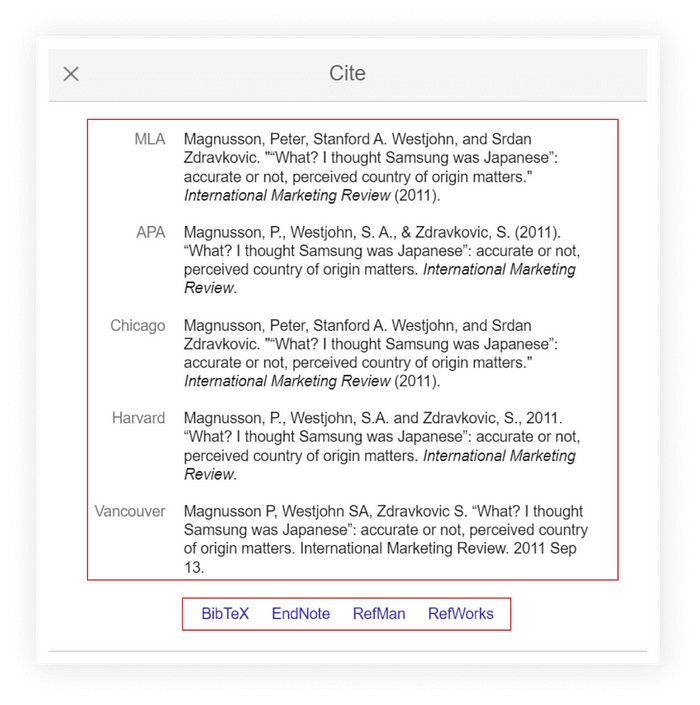
To make it work we need to create two functions:
- The first one will make a request to Google Scholar and extract all publication IDs.
- The second one will extract citation data.
Extracting IDs is necessary as it will be passed to the request URL in the second function otherwise we can't understand from which publication to extract citations.
from parsel import Selector
import requests, jsonparams = {
'q': 'blizzard', # search query
'hl': 'en' # language of the search
}headers = {
'User-Agent': 'Mozilla/5.0 (Windows NT 10.0; Win64; x64) AppleWebKit/537.36 (KHTML, like Gecko) Chrome/105.0.0.0 Safari/537.36',
'referer': f"https://scholar.google.com/scholar?hl={params['hl']}&q={params['q']}"
}# extracting citation ID from individual title
def parsel_get_cite_ids():
html = requests.get('https://scholar.google.com/scholar', params=params, headers=headers)
soup = Selector(text=html.text)# returns a list of publication ID's -> U8bh6Ca9uwQJ
return soup.css('.gs_r.gs_or.gs_scl::attr(data-cid)').getall()# extracting citattion data (MLA, APA...)
def parsel_scrape_cite_results():
citations = []for cite_id in parsel_get_cite_ids():
html = requests.get(f'https://scholar.google.com/scholar?output=cite&q=info:{cite_id}:scholar.google.com', headers=headers)
selector = Selector(text=html.text)# citations table
if selector.css('#gs_citt').get():
for result in selector.css('tr'):
institution = result.xpath('th/text()').get()
citation = result.xpath('td div/text()').get()citations.append({'institution': institution, 'citation': citation})return citationsprint(json.dumps(parsel_scrape_cite_results(), indent=2, ensure_ascii=False))# Part of the output:
'''
[
{
"institution": "MLA",
"citation": "King, Simon, et al. "The blizzard challenge 2008." (2008)."
}, ... other citations
{
"institution": "Vancouver",
"citation": "King S, Clark RA, Mayo C, Karaiskos V. The blizzard challenge 2008."
}
]
'''
Scrape Google Scholar Cite Results using SerpApi
# Docs: [https://serpapi.com/google-scholar-cite-api](https://serpapi.com/google-scholar-cite-api)import json, os
from serpapi import GoogleScholarSearchdef organic_results():
params = {
# https://docs.python.org/3/library/os.html
'api_key': os.getenv('API_KEY'), # serpapi api key
'engine': 'google_scholar', # serpapi parsing engine
'q': 'blizzard', # search query
'hl': 'en' # language
}search = GoogleScholarSearch(params)
results = search.get_dict()return [result['result_id'] for result in results['organic_results']]def cite_results():citations = []for citation_id in organic_results():
params = {
# https://docs.python.org/3/library/os.html
'api_key': os.getenv('API_KEY'),
'engine': 'google_scholar_cite',
'q': citation_id
}
search = GoogleScholarSearch(params)
results = search.get_dict()for result in results['citations']:
institution = result['title']
citation = result['snippet']citations.append({
'institution': institution,
'citations': citation
})return citationsprint(json.dumps(cite_results(), indent=2, ensure_ascii=False))# Part of the output:
'''
[
{
"institution": "MLA",
"citation": "King, Simon, et al. "The blizzard challenge 2008." (2008)."
}, ... other citations
{
"institution": "Vancouver",
"citation": "King S, Clark RA, Mayo C, Karaiskos V. The blizzard challenge 2008."
}
]
'''
Scrape Google Scholar Profiles Results with Pagination
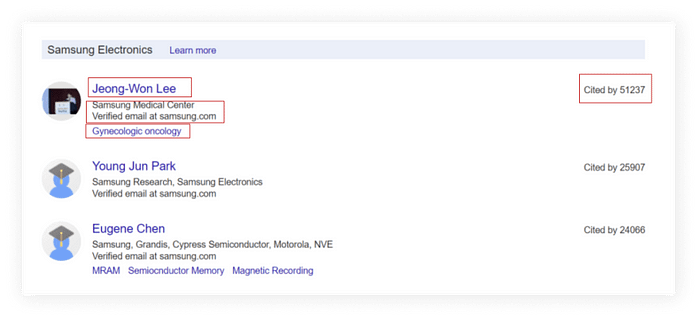
from parsel import Selector
import requests, json, redef scrape_all_authors():
params = {
'view_op': 'search_authors', # author results
'mauthors': 'blizzard', # search query
'hl': 'en', # language of the search
'astart': 0 # page number
}headers = {
'User-Agent': 'Mozilla/5.0 (Windows NT 10.0; Win64; x64) AppleWebKit/537.36 (KHTML, like Gecko) Chrome/105.0.0.0 Safari/537.36'
}data = []while True:
html = requests.get('https://scholar.google.com/citations', params=params, headers=headers, timeout=30)
soup = Selector(text=html.text)for author in soup.css('.gs_ai_chpr'):
name = author.css('.gs_ai_name a').xpath('normalize-space()').get()
link = f'https://scholar.google.com{author.css(".gs_ai_name a::attr(href)").get()}'
affiliations = author.css('.gs_ai_aff').xpath('normalize-space()').get()
email = author.css('.gs_ai_eml').xpath('normalize-space()').get()
try:
cited_by = re.search(r'\d+', author.css('.gs_ai_cby::text').get()).group() # Cited by 17143 -> 17143
except: cited_by = Nonedata.append({
'name': name,
'link': link,
'affiliations': affiliations,
'email': email,
'cited_by': cited_by
})# check if the next arrow button is active by checking 'onclick' attribute
if soup.css('.gsc_pgn button.gs_btnPR::attr(onclick)').get():
# extracting next page token and passing to 'after_author' query URL parameter
params['after_author'] = re.search(r'after_author\\x3d(.*)\\x26', str(soup.css('.gsc_pgn button.gs_btnPR::attr(onclick)').get())).group(1) # -> XB0HAMS9__8J
params['astart'] += 10
else:
break
print(json.dumps(data, indent=2, ensure_ascii=False))# Part of the output:
'''
[
{
"name": "Adam Lobel",
"link": "https://scholar.google.com/citations?hl=en&user=_xwYD2sAAAAJ",
"affiliations": "Blizzard Entertainment",
"email": "Verified email at AdamLobel.com",
"cited_by": "3357"
},
{
"name": "Vladimir Ivanov",
"link": "https://scholar.google.com/citations?hl=en&user=rddjbZcAAAAJ",
"affiliations": "Blizzard Entertainment",
"email": "",
"cited_by": null
}
]
Scrape Google Scholar Profiles using SerpApi
# Docs: https://serpapi.com/google-scholar-profiles-api
from serpapi import GoogleSearch
import osdef serpapi_scrape_all_authors():
params = {
# https://docs.python.org/3/library/os.html
'api_key': os.getenv('API_KEY'), # SerpApi API key
'engine': 'google_scholar_profiles', # profile results search engine
'mauthors': 'blizzard' # search query
}
search = GoogleSearch(params)profile_results_data = []
profiles_is_present = True
while profiles_is_present:
profile_results = search.get_dict()
for profile in profile_results['profiles']:
print(f'Currently extracting {profile["name"]} with {profile["author_id"]} ID.')
thumbnail = profile['thumbnail']
name = profile['name']
link = profile['link']
author_id = profile['author_id']
affiliations = profile['affiliations']
email = profile.get('email')
cited_by = profile.get('cited_by')
interests = profile.get('interests')profile_results_data.append({
'thumbnail': thumbnail,
'name': name,
'link': link,
'author_id': author_id,
'email': email,
'affiliations': affiliations,
'cited_by': cited_by,
'interests': interests
})
# # check if the next page is present in 'serpapi_pagination' dict key
if 'next' in profile_results['pagination']:
# split URL in parts as a dict() and update search 'params' variable to a new page
search.params_dict.update(dict(parse_qsl(urlsplit(profile_results['pagination']['next']).query)))
else:
profiles_is_present = Falsereturn profile_results_dataprint(json.dumps(serpapi_scrape_all_authors(), indent=2))# Part of the output:
'''
[
{
"thumbnail": "https://scholar.googleusercontent.com/citations?view_op=small_photo&user=_xwYD2sAAAAJ&citpid=3",
"name": "Adam Lobel",
"link": "https://scholar.google.com/citations?hl=en&user=_xwYD2sAAAAJ",
"author_id": "_xwYD2sAAAAJ",
"email": "Verified email at AdamLobel.com",
"affiliations": "Blizzard Entertainment",
"cited_by": 3357,
"interests": [
{
"title": "Gaming",
"serpapi_link": "https://serpapi.com/search.json?engine=google_scholar_profiles&hl=en&mauthors=label%3Agaming",
"link": "https://scholar.google.com/citations?hl=en&view_op=search_authors&mauthors=label:gaming"
},
{
"title": "Emotion regulation",
"serpapi_link": "https://serpapi.com/search.json?engine=google_scholar_profiles&hl=en&mauthors=label%3Aemotion_regulation",
"link": "https://scholar.google.com/citations?hl=en&view_op=search_authors&mauthors=label:emotion_regulation"
}
]
},
{
"thumbnail": "https://scholar.google.com/citations/images/avatar_scholar_56.png",
"name": "Vladimir Ivanov",
"link": "https://scholar.google.com/citations?hl=en&user=rddjbZcAAAAJ",
"author_id": "rddjbZcAAAAJ",
"email": null,
"affiliations": "Blizzard Entertainment",
"cited_by": null,
"interests": [
{
"title": "Machine Learning",
"serpapi_link": "https://serpapi.com/search.json?after_author=tHCJAID___8J&engine=google_scholar_profiles&hl=en&mauthors=label%3Amachine_learning",
"link": "https://scholar.google.com/citations?hl=en&view_op=search_authors&mauthors=label:machine_learning"
},
{
"title": "Reinforcement Learning",
"serpapi_link": "https://serpapi.com/search.json?after_author=tHCJAID___8J&engine=google_scholar_profiles&hl=en&mauthors=label%3Areinforcement_learning",
"link": "https://scholar.google.com/citations?hl=en&view_op=search_authors&mauthors=label:reinforcement_learning"
},
{
"title": "Computer Vision",
"serpapi_link": "https://serpapi.com/search.json?after_author=tHCJAID___8J&engine=google_scholar_profiles&hl=en&mauthors=label%3Acomputer_vision",
"link": "https://scholar.google.com/citations?hl=en&view_op=search_authors&mauthors=label:computer_vision"
},
{
"title": "Cinematics",
"serpapi_link": "https://serpapi.com/search.json?after_author=tHCJAID___8J&engine=google_scholar_profiles&hl=en&mauthors=label%3Acinematics",
"link": "https://scholar.google.com/citations?hl=en&view_op=search_authors&mauthors=label:cinematics"
}
]
}
]
'''
Scrape Google Scholar Author Info
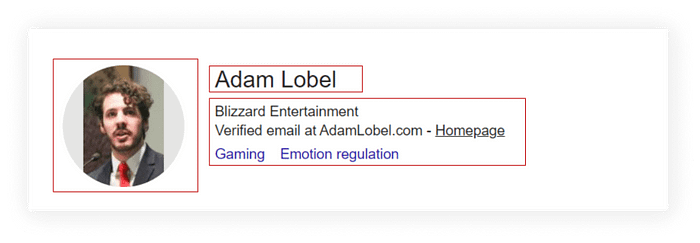
from parsel import Selector
import requests, os, jsondef parsel_scrape_author_co_authors():
params = {
'user': '_xwYD2sAAAAJ', # user-id
'hl': 'en' # language
}
headers = {
'User-Agent': 'Mozilla/5.0 (Windows NT 10.0; Win64; x64) AppleWebKit/537.36 (KHTML, like Gecko) Chrome/105.0.0.0 Safari/537.36'
}
html = requests.get('https://scholar.google.com/citations', params=params, headers=headers, timeout=30)
selector = Selector(text=html.text)
author_info = {}
author_info['name'] = selector.css('#gsc_prf_in::text').get()
author_info['affiliation'] = selector.css('#gsc_prf_inw+ .gsc_prf_il::text').get()
author_info['email'] = selector.css('#gsc_prf_inw+ .gsc_prf_il::text').get()
author_info['website'] = selector.css('.gsc_prf_ila::attr(href)').get()
author_info['interests'] = selector.css('#gsc_prf_int .gs_ibl::text').getall(),
author_info['thumbnail'] = selector.css('#gsc_prf_pup-img::attr(src)').get()
print(json.dumps(author_info, indent=2, ensure_ascii=False))
parsel_scrape_author_co_authors()
# Output:
'''
{
"name": "Adam Lobel",
"affiliation": "Blizzard Entertainment",
"email": "Blizzard Entertainment",
"website": "https://twitter.com/GrowingUpGaming",
"interests": [
[
"Gaming",
"Emotion regulation"
]
],
"thumbnail": "https://scholar.googleusercontent.com/citations?view_op=view_photo&user=_xwYD2sAAAAJ&citpid=3"
}
'''
Scrape Google Scholar Author Info using SerpApi
# Docs: https://serpapi.com/google-scholar-author-api
import os, json
from serpapi import GoogleScholarSearch
def serpapi_scrape_author_info():
params = {
# https://docs.python.org/3/library/os.html
'api_key': os.getenv('API_KEY'),
"engine": "google_scholar_author",
"hl": "en",
"author_id": "_xwYD2sAAAAJ"
}
search = GoogleScholarSearch(params)
results = search.get_dict()
print(json.dumps(results['author'], indent=2, ensure_ascii=False))serpapi_scrape_author_info()'''
{
"name": "Adam Lobel",
"affiliations": "Blizzard Entertainment",
"email": "Verified email at AdamLobel.com",
"website": "https://twitter.com/GrowingUpGaming",
"interests": [
{
"title": "Gaming",
"link": "https://scholar.google.com/citations?view_op=search_authors&hl=en&mauthors=label:gaming",
"serpapi_link": "https://serpapi.com/search.json?engine=google_scholar_profiles&hl=en&mauthors=label%3Agaming"
},
{
"title": "Emotion regulation",
"link": "https://scholar.google.com/citations?view_op=search_authors&hl=en&mauthors=label:emotion_regulation",
"serpapi_link": "https://serpapi.com/search.json?engine=google_scholar_profiles&hl=en&mauthors=label%3Aemotion_regulation"
}
],
"thumbnail": "https://scholar.googleusercontent.com/citations?view_op=view_photo&user=_xwYD2sAAAAJ&citpid=3"
}
'''
Scrape Google Scholar All Author Articles

from parsel import Selector
import requests, os, json
def parsel_scrape_all_author_articles():
params = {
'user': '_xwYD2sAAAAJ', # user-id
'hl': 'en', # language
'gl': 'us', # country to search from
'cstart': 0, # articles page. 0 is the first page
'pagesize': '100' # articles per page
}
headers = {
'User-Agent': 'Mozilla/5.0 (Windows NT 10.0; Win64; x64) AppleWebKit/537.36 (KHTML, like Gecko) Chrome/105.0.0.0 Safari/537.36'
}
all_articles = []
while True:
html = requests.get('https://scholar.google.com/citations', params=params, headers=headers, timeout=30)
selector = Selector(text=html.text)
for index, article in enumerate(selector.css('.gsc_a_tr'), start=1):
article_title = article.css('.gsc_a_at::text').get()
article_link = f"https://scholar.google.com{article.css('.gsc_a_at::attr(href)').get()}"
article_authors = article.css('.gsc_a_at+ .gs_gray::text').get()
article_publication = article.css('.gs_gray+ .gs_gray::text').get()
cited_by_count = article.css('.gsc_a_ac::text').get()
publication_year = article.css('.gsc_a_hc::text').get()
all_articles.append({
'position': index,
'title': article_title,
'link': article_link,
'authors': article_authors,
'publication': article_publication,
'publication_year': publication_year,
'cited_by_count': cited_by_count
})
# this selector is checking for the .class that contains: 'There are no articles in this profile.'
# example link: https://scholar.google.com/citations?user=VjJm3zYAAAAJ&hl=en&cstart=500&pagesize=100
if selector.css('.gsc_a_e').get():
break
else:
params['cstart'] += 100 # paginate to the next page
# [:-1] doesn't pick last element which is not we want and don't contain any data.
print(json.dumps(all_articles[:-1], indent=2, ensure_ascii=False))
parsel_scrape_all_author_articles()
# Part of the output:
'''
[
{
"position": 1,
"title": "The benefits of playing video games.",
"link": "https://scholar.google.com/citations?view_op=view_citation&hl=en&user=_xwYD2sAAAAJ&pagesize=100&citation_for_view=_xwYD2sAAAAJ:u5HHmVD_uO8C",
"authors": "I Granic, A Lobel, RCME Engels",
"publication": "American psychologist 69 (1), 66",
"publication_year": "2014",
"cited_by_count": "2669"
},
{
"position": 23,
"title": "The Relation Between Gaming and the Development of Emotion Regulation Skills",
"link": "https://scholar.google.com/citations?view_op=view_citation&hl=en&user=_xwYD2sAAAAJ&pagesize=100&citation_for_view=_xwYD2sAAAAJ:ufrVoPGSRksC",
"authors": "A Lobel",
"publication": null,
"publication_year": null,
"cited_by_count": null
}
]
'''
Scrape Google Scholar All Author Articles using SerpApi
# Docs: https://serpapi.com/google-scholar-author-api
from serpapi import GoogleScholarSearch
from urllib.parse import urlsplit, parse_qsl
import os, json
def serpapi_scrape_articles():
params = {
# https://docs.python.org/3/library/os.html
'api_key': os.getenv('API_KEY'), # your serpapi api key
'engine': 'google_scholar_author', # serpapi parsing engine
'hl': 'en', # language of the search
'author_id': '_xwYD2sAAAAJ', # author ID
'start': '0', # page number: 0 - first, 1 second and so on.
'num': '100' # number of articles per page
}
search = GoogleScholarSearch(params)
all_articles = []
while True:
results = search.get_dict()
for article in results['articles']:
title = article.get('title')
link = article.get('link')
authors = article.get('authors')
publication = article.get('publication')
citation_id = article.get('citation_id')
year = article.get('year')
cited_by_count = article.get('cited_by').get('value')
all_articles.append({
'title': title,
'link': link,
'authors': authors,
'publication': publication,
'citation_id': citation_id,
'cited_by_count': cited_by_count,
'year': year
})
# check if the next page is present in 'serpapi_pagination' dict key
if 'next' in results.get('serpapi_pagination', []):
# split URL in parts as a dict() and update 'search' variable to a new page
search.params_dict.update(dict(parse_qsl(urlsplit(results['serpapi_pagination']['next']).query)))
else:
breakprint(json.dumps(all_articles, indent=2, ensure_ascii=False))serpapi_scrape_articles()# Part of the output:
'''
[
{
"title": "The benefits of playing video games.",
"link": "https://scholar.google.com/citations?view_op=view_citation&hl=en&user=_xwYD2sAAAAJ&pagesize=100&citation_for_view=_xwYD2sAAAAJ:u5HHmVD_uO8C",
"authors": "I Granic, A Lobel, RCME Engels",
"publication": "American psychologist 69 (1), 66, 2014",
"citation_id": "_xwYD2sAAAAJ:u5HHmVD_uO8C",
"cited_by_count": 2669,
"year": "2014"
},
{
"title": "The Relation Between Gaming and the Development of Emotion Regulation Skills",
"link": "https://scholar.google.com/citations?view_op=view_citation&hl=en&user=_xwYD2sAAAAJ&pagesize=100&citation_for_view=_xwYD2sAAAAJ:ufrVoPGSRksC",
"authors": "A Lobel",
"publication": null,
"citation_id": "_xwYD2sAAAAJ:ufrVoPGSRksC",
"cited_by_count": null,
"year": ""
}
]
'''
Scrape Google Scholar Cited by, Graph and Public Access
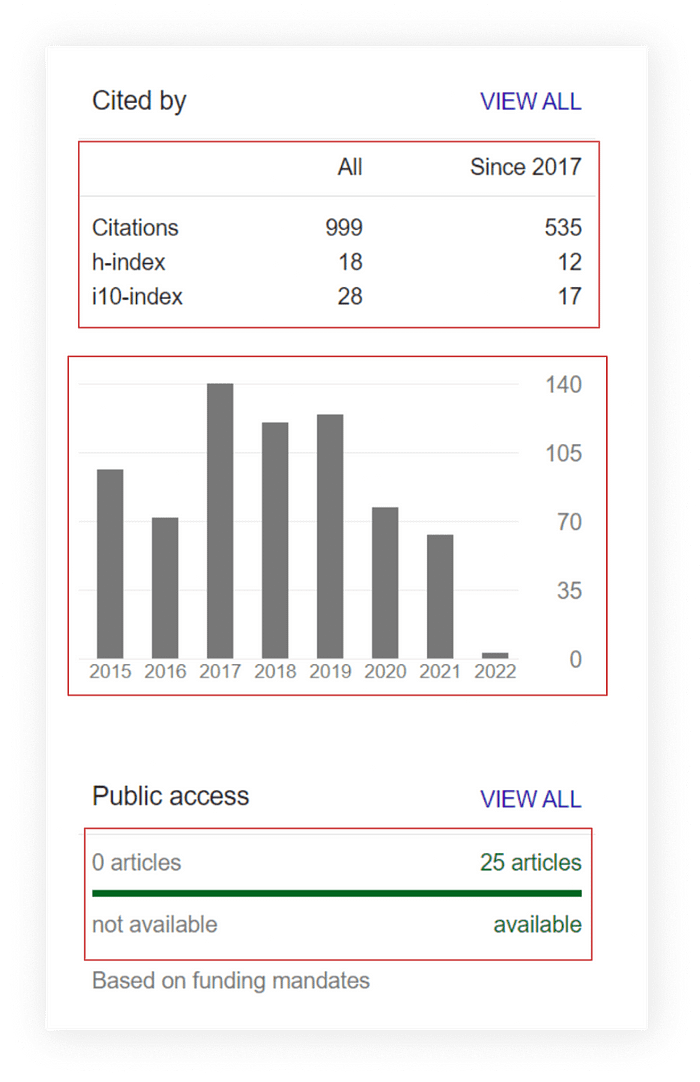
from parsel import Selector
import requests, os, json
def parsel_scrape_author_cited_by_graph():
params = {
'user': '_xwYD2sAAAAJ', # user-id
'hl': 'en' # language
}
headers = {
'User-Agent': 'Mozilla/5.0 (Windows NT 10.0; Win64; x64) AppleWebKit/537.36 (KHTML, like Gecko) Chrome/105.0.0.0 Safari/537.36'
}
html = requests.get('https://scholar.google.com/citations', params=params, headers=headers, timeout=30)
selector = Selector(text=html.text)
data = {
'cited_by': [],
'graph': []
}
since_year = selector.css('.gsc_rsb_sth~ .gsc_rsb_sth+ .gsc_rsb_sth::text').get().lower().replace(' ', '_')for cited_by_public_access in selector.css('.gsc_rsb'):
data['cited_by'].append({
'citations_all': cited_by_public_access.css('tr:nth-child(1) .gsc_rsb_sc1+ .gsc_rsb_std::text').get(),
f'citations_since_{since_year}': cited_by_public_access.css('tr:nth-child(1) .gsc_rsb_std+ .gsc_rsb_std::text').get(),
'h_index_all': cited_by_public_access.css('tr:nth-child(2) .gsc_rsb_sc1+ .gsc_rsb_std::text').get(),
f'h_index_since_{since_year}': cited_by_public_access.css('tr:nth-child(2) .gsc_rsb_std+ .gsc_rsb_std::text').get(),
'i10_index_all': cited_by_public_access.css('tr~ tr+ tr .gsc_rsb_sc1+ .gsc_rsb_std::text').get(),
f'i10_index_since_{since_year}': cited_by_public_access.css('tr~ tr+ tr .gsc_rsb_std+ .gsc_rsb_std::text').get(),
'articles_num': cited_by_public_access.css('.gsc_rsb_m_a:nth-child(1) span::text').get().split(' ')[0],
'articles_link': f"https://scholar.google.com{cited_by_public_access.css('#gsc_lwp_mndt_lnk::attr(href)').get()}"
})
for graph_year, graph_yaer_value in zip(selector.css('.gsc_g_t::text'), selector.css('.gsc_g_al::text')):
data['graph'].append({
'year': graph_year.get(),
'value': int(graph_yaer_value.get())
})
print(json.dumps(data, indent=2, ensure_ascii=False))
parsel_scrape_author_cited_by_graph()
# Output:
'''
{
"cited_by": [
{
"citations_all": "3363",
"citations_since_since_2017": "2769",
"h_index_all": "10",
"h_index_since_since_2017": "10",
"i10_index_all": "11",
"i10_index_since_since_2017": "10",
"articles": {
"available": 1,
"not_available": 0
},
"articles_link": "https://scholar.google.com/citations?view_op=list_mandates&hl=en&user=_xwYD2sAAAAJ"
}
],
"graph": [
{
"year": "2014",
"value": 69
},
{
"year": "2015",
"value": 190
},
{
"year": "2016",
"value": 243
},
{
"year": "2017",
"value": 343
},
{
"year": "2018",
"value": 435
},
{
"year": "2019",
"value": 563
},
{
"year": "2020",
"value": 516
},
{
"year": "2021",
"value": 557
},
{
"year": "2022",
"value": 352
}
]
}
'''
Scrape Google Scholar Author Cited By, Graph and Public Access using SerpApi
# Docs: https://serpapi.com/google-scholar-author-api
import os, json
from serpapi import GoogleScholarSearch
def serpapi_scrape_author_cited_by_graph():
params = {
# https://docs.python.org/3/library/os.html
'api_key': os.getenv('API_KEY'),
'engine': 'google_scholar_author',
'author_id': 'EicYvbwAAAAJ',
'hl': 'en'
}
search = GoogleScholarSearch(params)
results = search.get_dict()
data = {
'cited_by': [],
'public_access': {},
'graph': []
}
data['cited_by'] = results['cited_by']['table']
data['public_access']['link'] = results['public_access']['link']
data['public_access']['articles_available'] = results['public_access']['available']
data['public_access']['articles_not_available'] = results['public_access']['not_available']
data['graph'] = results['cited_by']['graph']
print(json.dumps(data, indent=2, ensure_ascii=False))
serpapi_scrape_author_cited_by_graph()
# Output:
'''
{
"cited_by": [
{
"citations": {
"all": 487128,
"since_2017": 183326
}
},
{
"h_index": {
"all": 319,
"since_2017": 194
}
},
{
"i10_index": {
"all": 1149,
"since_2017": 932
}
}
],
"public_access": {
"link": "https://scholar.google.com/citations?view_op=list_mandates&hl=en&user=EicYvbwAAAAJ",
"articles_available": 522,
"articles_not_available": 32
},
"graph": [
{
"year": 1994,
"citations": 1537
},
{
"year": 1995,
"citations": 1921
},
{
"year": 1996,
"citations": 2202
},
{
"year": 1997,
"citations": 2979
},
{
"year": 1998,
"citations": 3500
},
{
"year": 1999,
"citations": 4187
},
{
"year": 2000,
"citations": 5629
},
{
"year": 2001,
"citations": 6242
},
{
"year": 2002,
"citations": 7213
},
{
"year": 2003,
"citations": 7863
},
{
"year": 2004,
"citations": 8995
},
{
"year": 2005,
"citations": 9889
},
{
"year": 2006,
"citations": 11674
},
{
"year": 2007,
"citations": 12879
},
{
"year": 2008,
"citations": 15212
},
{
"year": 2009,
"citations": 17043
},
{
"year": 2010,
"citations": 18213
},
{
"year": 2011,
"citations": 20568
},
{
"year": 2012,
"citations": 22596
},
{
"year": 2013,
"citations": 25036
},
{
"year": 2014,
"citations": 26488
},
{
"year": 2015,
"citations": 28138
},
{
"year": 2016,
"citations": 28442
},
{
"year": 2017,
"citations": 28817
},
{
"year": 2018,
"citations": 30272
},
{
"year": 2019,
"citations": 31383
},
{
"year": 2020,
"citations": 32410
},
{
"year": 2021,
"citations": 35746
},
{
"year": 2022,
"citations": 24456
}
]
}
'''
Scrape Google Scholar Co-Authors from Author Page

from parsel import Selector
import requests, os, json, re
def parsel_scrape_author_co_authors():
params = {
'user': '_xwYD2sAAAAJ', # user-id
'hl': 'en' # language
}
headers = {
'User-Agent': 'Mozilla/5.0 (Windows NT 10.0; Win64; x64) AppleWebKit/537.36 (KHTML, like Gecko) Chrome/105.0.0.0 Safari/537.36'
}
co_authors = []
html = requests.get('https://scholar.google.com/citations', params=params, headers=headers, timeout=30)
selector = Selector(text=html.text)
for result in selector.css('.gsc_rsb_aa'):
co_authors.append({
'name': result.css('.gsc_rsb_a_desc a::text').get(),
'title': result.css('.gsc_rsb_a_ext::text').get(),
'link':
f"https://scholar.google.com{result.css('.gsc_rsb_a_desc a::attr(href)').get()}",
'email':
result.css('.gsc_rsb_a_ext.gsc_rsb_a_ext2::text').get(),
# https://regex101.com/r/awJNhL/1
# extracting user ID and passing to 'user' URL parameter
'thumbnail':
f"https://scholar.googleusercontent.com/citations?view_op=view_photo&user={re.search(r'user=(.*)&', result.css('.gsc_rsb_a_desc a::attr(href)').get()).group(1)}"
})
print(json.dumps(co_authors, indent=2, ensure_ascii=False))
parsel_scrape_author_co_authors()
# Part of the output:
'''
[
{
"name": "Isabela Granic",
"title": "Radboud University Nijmegen",
"link": "https://scholar.google.com/citations?user=4T5cjVIAAAAJ&hl=en",
"email": "Verified email at pwo.ru.nl",
"thumbnail": "https://scholar.googleusercontent.com/citations?view_op=view_photo&user=4T5cjVIAAAAJ"
}, ... other authors
{
"name": "Esther Steenbeek-Planting",
"title": "Postdoctoral researcher Max Planck Institute for Psycholinguistics / Donders Insitute for Brain, Cognition and Behaviour, Centre for Cognition",
"link": "https://scholar.google.com/citations?user=IsC9Le8AAAAJ&hl=en",
"email": "Verified email at donders.ru.nl",
"thumbnail": "https://scholar.googleusercontent.com/citations?view_op=view_photo&user=IsC9Le8AAAAJ"
}
]
'''
Scrape Google Scholar Co-Authors from Author page using SerpApi
# Docs: https://serpapi.com/google-scholar-author-api
from serpapi import GoogleSearch
import os, json
def serpapi_scrape_author_co_author():
params = {
# https://docs.python.org/3/library/os.html
'api_key': os.getenv('API_KEY'),
'engine': 'google_scholar_author',
'hl': 'en',
'author_id': '_xwYD2sAAAAJ'
}
search = GoogleScholarSearch(params)
results = search.get_dict()
print(json.dumps(results['co_authors'], indent=2, ensure_ascii=False))
serpapi_scrape_author_co_author()
# Part of the output:
'''
[
{
"name": "Isabela Granic",
"link": "https://scholar.google.com/citations?user=4T5cjVIAAAAJ&hl=en",
"serpapi_link": "https://serpapi.com/search.json?author_id=4T5cjVIAAAAJ&engine=google_scholar_author&hl=en",
"author_id": "4T5cjVIAAAAJ",
"affiliations": "Radboud University Nijmegen",
"email": "Verified email at pwo.ru.nl",
"thumbnail": "https://scholar.googleusercontent.com/citations?view_op=small_photo&user=4T5cjVIAAAAJ&citpid=4"
}, ... other authors
{
"name": "Esther Steenbeek-Planting",
"link": "https://scholar.google.com/citations?user=IsC9Le8AAAAJ&hl=en",
"serpapi_link": "https://serpapi.com/search.json?author_id=IsC9Le8AAAAJ&engine=google_scholar_author&hl=en",
"author_id": "IsC9Le8AAAAJ",
"affiliations": "Postdoctoral researcher Max Planck Institute for Psycholinguistics / Donders Insitute for Brain, Cognition and Behaviour, Centre for Cognition",
"email": "Verified email at donders.ru.nl",
"thumbnail": "https://scholar.googleusercontent.com/citations?view_op=small_photo&user=IsC9Le8AAAAJ&citpid=2"
}
]
'''
Links
Comments
Loading comments…